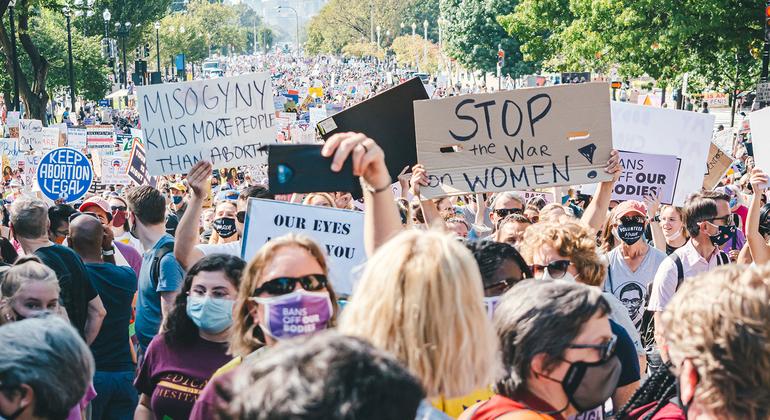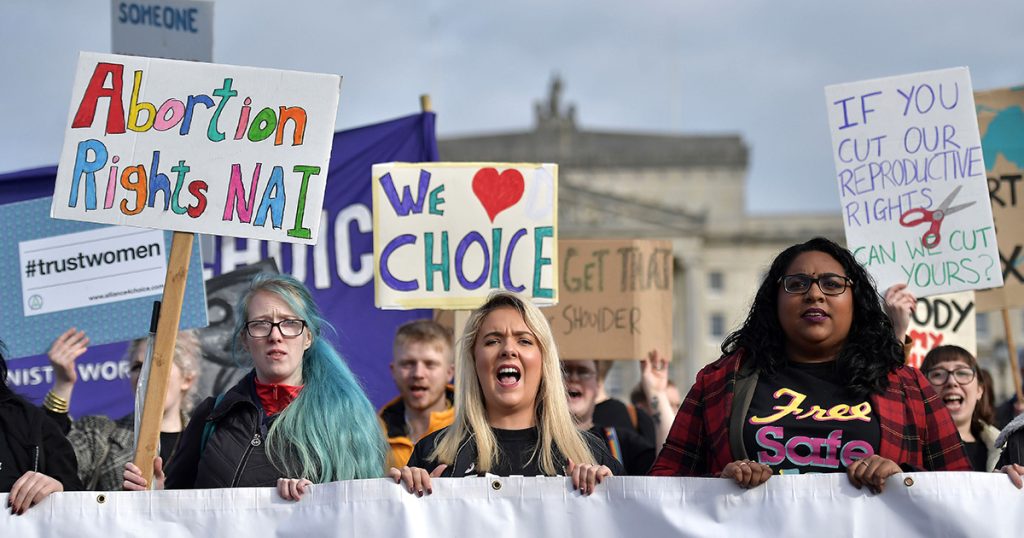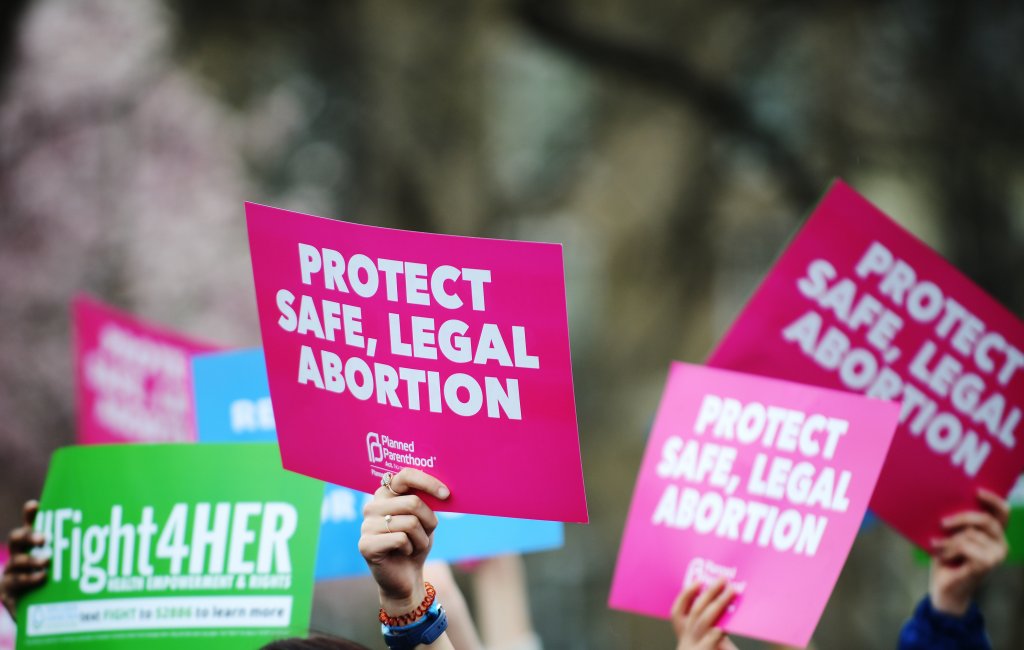UN Experts: Abortion Bans in the United States Endanger Millions of Women and Girls.

Millions of women and girls in the United States find themselves in a distressing situation as they witness a rapid decline in their access to vital sexual and reproductive healthcare. This alarming deterioration is a direct consequence of a landmark decision by the US Supreme Court in June 2022, which overturned the constitutional right to abortion. The reverberations of this decision, particularly in the case of Dobbs v. Jackson Women’s Health Organisation, have sent shockwaves throughout the entire legal and policy system, causing significant disruptions in the lives of countless individuals.
As of January 2023, the implications of the Supreme Court ruling have materialized in the form of abortion bans enacted in 14 states across the country. These bans have had far-reaching consequences, severely limiting and even eliminating reproductive autonomy and healthcare options for women and girls. International experts appointed by the United Nations (UN) have expressed deep concern over the regressive stance adopted by the US Supreme Court, effectively dismantling five decades of precedent that protected the right to abortion in the country.
The UN experts emphasize that this decision puts millions of vulnerable women and girls at serious risk. By eroding long-standing protections and access to abortion services, their well-being, health, and rights are under threat. The repercussions of these restrictions reverberate beyond the individual level, affecting families, communities, and society as a whole. The experts have also highlighted the potential violations of International Human Rights Law resulting from the Supreme Court judgment, underscoring the urgent need for rectification and adherence to international standards.
The erosion of abortion rights not only infringes upon women’s bodily autonomy but also restricts their ability to make informed decisions about their reproductive health. The availability of safe and legal abortion services is a crucial component of comprehensive healthcare for women, allowing them to exercise control over their own bodies and futures. When these rights are undermined or denied, the consequences are far-reaching and affect individuals in their most personal and intimate choices, often leading to adverse health outcomes and increased social inequalities.
Addressing this critical issue requires a multifaceted approach. Legal reforms must be pursued to protect and restore women’s and girls’ reproductive rights. Public awareness campaigns should aim to educate the public about the importance of comprehensive reproductive healthcare services and the negative impact of restrictive measures. Advocacy efforts are vital to mobilize support for policies that safeguard reproductive rights and promote access to safe and legal abortion services. Collaboration between policymakers, healthcare providers, civil society organizations, and international bodies is crucial in driving these changes and ensuring that women and girls in the United States regain their rightful access to sexual and reproductive healthcare without discrimination or harm.

In conclusion, the alarming deterioration of access to sexual and reproductive healthcare for women and girls in the United States, following the Supreme Court decision overturning the constitutional right to abortion, demands immediate attention. The far-reaching implications of this decision have jeopardized the well-being, health, and rights of millions of individuals. Upholding and expanding reproductive rights is crucial to empower women and girls, allowing them to make informed decisions about their bodies and futures. It is imperative to address the violations of International Human Rights Law resulting from this ruling and work collaboratively towards the restoration of comprehensive sexual and reproductive healthcare services in the United States.
The implementation of abortion bans in 14 states across the United States has resulted in a significant lack of accessibility to abortion services, thereby depriving women and girls of their fundamental human rights to comprehensive healthcare, including sexual and reproductive health. According to the experts, these bans have the potential to infringe upon various rights of women, including the right to privacy, bodily integrity, and autonomy, as well as the rights to freedom of expression, thought, conscience, religion or belief, equality, non-discrimination, and freedom from torture, cruel, inhuman, and degrading treatment, as well as gender-based violence.
The experts have expressed concern that the consequences of these bans disproportionately impact women and girls in disadvantaged situations. Specifically, they have drawn attention to the marginalized communities, racial and ethnic minorities, migrants, women and girls with disabilities, those living on low incomes, individuals in abusive relationships, and those residing in rural areas. These vulnerable groups are particularly vulnerable to the detrimental effects of the abortion bans, further exacerbating existing inequalities and hindering their access to essential healthcare services.

It is evident that the implementation of these abortion bans has created a grave situation, impeding women and girls from exercising their basic human rights and placing them at a significant disadvantage, especially those already facing multiple forms of marginalization. The denial of comprehensive reproductive healthcare further perpetuates existing disparities, reinforcing the need for urgent attention and concerted efforts to address these systemic issues and ensure that all women and girls, regardless of their background or circumstances, have equal access to the healthcare they need and deserve.
he experts have highlighted that the existing exceptions to the abortion bans, although limited in scope, have proven to be unfeasible in practice. They expressed concerns that these exceptions often do not align with medical diagnoses and sometimes exclude conditions that pose a threat to a person’s health. Additionally, even in cases where physicians determine that an abortion is necessary, they may encounter difficulties in assembling a complete healthcare team due to the reluctance of other professionals.
The experts cautioned that the Supreme Court decision has had a chilling effect on doctors and healthcare workers who now face potential legal repercussions for their care decisions, including situations involving medically necessary or life-saving abortions or the removal of fetal tissue in cases of incomplete miscarriages.
Moreover, the experts expressed deep alarm over the escalating reports of threats against abortion service providers throughout the country. The safety and lives of these healthcare professionals are increasingly at risk, creating a hostile environment that further hampers access to essential reproductive healthcare services.
The threat of criminalization in many states has had a detrimental impact on women and girls, dissuading them from engaging with the healthcare system and seeking prenatal care. The experts emphasized that this is particularly concerning as it poses risks to maternal and fetal health. They further noted with alarm that some clinics are now refraining from providing abortion-related services, even in states where such services remain legally permissible.
These developments underscore the gravity of the situation, where legal barriers, intimidation, and the fear of prosecution have not only limited women and girls’ access to essential healthcare but have also created a climate of fear and uncertainty for healthcare providers. It is imperative to address these challenges to ensure that reproductive healthcare remains accessible, that healthcare professionals can provide care without fear, and that women and girls are not deterred from seeking the necessary services they require for their well-being and reproductive rights.

The experts have drawn attention to the concerning consequences accompanying the abortion bans implemented in various states across the United States. They have noted a troubling erosion of the right to privacy as law enforcement agencies increasingly employ electronic data to monitor individuals seeking abortions or those who assist them. Alarmingly, much of this data can be accessed without the need for a warrant, raising significant concerns about privacy infringement.
In light of these developments, the experts have called upon both the federal and state governments to take decisive action. They urge policymakers to reverse the regressive rhetoric that is permeating the legislative system and instead focus on enacting positive measures that safeguard access to safe and legal abortion. By doing so, they emphasize the importance of ensuring that women and girls can exercise their reproductive rights while maintaining their privacy and dignity.
The experts’ appeal reflects the urgent need for proactive steps to protect reproductive healthcare and preserve the rights of individuals seeking abortion services. It highlights the significance of legislative action in countering the erosion of privacy rights and the importance of creating an environment where access to safe and legal abortion is guaranteed. Efforts must be made to prioritize the well-being and autonomy of women and girls, ensuring that they can make informed choices about their reproductive health without fear of intrusion or surveillance.



